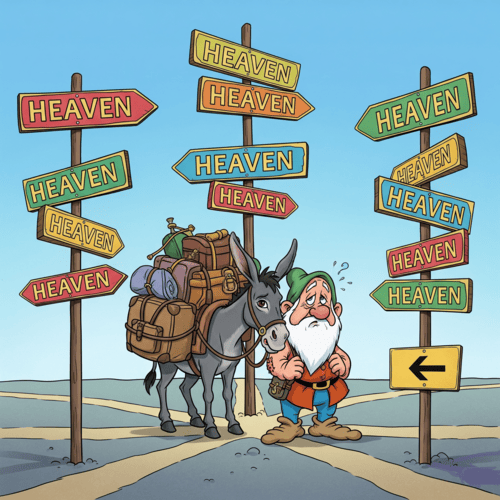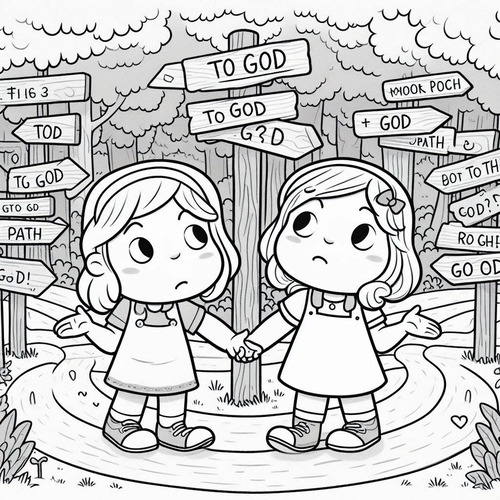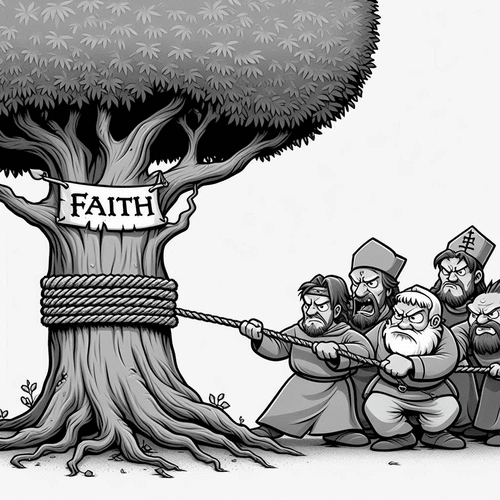Is Jesus the Only Way to Heaven? Answering 5 Common Objections
In an increasingly connected world, the Christian claim that Jesus is the only way to salvation sounds harsh to manythe Christian claim that Jesus is the only way to salvation sounds harsh to many. How can followers of Christ maintain their faith offers the exclusive path to God when billions of sincere, moral people follow other religious traditions? The tension between biblical truth and cultural sensitivity creates one of the most challenging conversations Christians face today.
Yet Jesus Himself made this exclusive claim unmistakably clear: “I am the way and the truth and the life. No one comes to the Father except through me” (John 14:6). The apostles echoed this conviction, declaring “salvation is found in no one else, for there is no other name under heaven given to mankind by which we must be saved” (Acts 4:12).
These aren’t merely religious opinions but foundational truths that deserve thoughtful examination. Let’s address five of the most common objections to Christ’s exclusivity for salvation, not so much to win arguments but to understand why this difficult truth is actually the most loving message the world has ever heard.
1. “WHAT ABOUT GOOD PEOPLE OF OTHER RELIGIONS?”
Perhaps no objection tugs at our hearts more than this one. We know sincere Muslims, devout Hindus, and moral atheists who live exemplary lives. How could a loving God condemn such good people simply because they haven’t embraced Christianity?
The objection reveals a fundamental misunderstanding of both human nature and divine holiness. The Bible teaches “all have sinned and fall short of the glory of God” (Romans 3:23). This isn’t about being “bad people” versus “good people”—it’s about the universal human condition before a perfectly holy God.
Consider this analogy: imagine trying to jump across the Grand Canyon. Whether you’re an Olympic athlete who jumps 25 feet or someone who can barely jump 5 feet, you both fall into the canyon. The gap between human goodness and divine perfection is infinitely greater than any canyon. Our best moral efforts, while admirable, cannot bridge the chasm.
This is why salvation must come through grace, not works. “For it is by grace you have been saved, through faith—and this is not from yourselves, it is the gift of God—not by works, so that no one can boast” (Ephesians 2:8-9). God’s standard isn’t comparative goodness but absolute perfection, which only Christ achieved on our behalf. It highlights why even the most sincere religious devotion needs the cross of Christ to truly reconcile us to God.
2. “CHRISTIANITY IS JUST ONE PATH AMONG MANY”
Modern pluralism suggests all religions are essentially different paths up the same mountain, each valid in its own way. This sounds tolerant and inclusive, but it crumbles under careful examination.
Major world religions make fundamentally contradictory claims about reality. Christianity teaches Jesus is God incarnate; Islam explicitly denies this. Buddhism generally denies the existence of a personal God; Judaism and Christianity affirm it. Hinduism embraces reincarnation; Christianity teaches resurrection. These aren’t minor differences in approach—they’re mutually exclusive truth claims about the nature of ultimate reality.
Logic demands that contradictory statements cannot all be true simultaneously. If Jesus is “the way, the truth, and the life,” then ways that contradict His teaching cannot also be true paths to God. This isn’t narrow-mindedness; it’s intellectual honesty.
Moreover, Jesus didn’t present Himself as one good teacher among many. He claimed to be the unique Son of God, the only mediator between God and humanity (1 Timothy 2:5). Either these claims are true, making Him uniquely qualified for salvation, or they’re false, making Him unworthy of following at all. The middle ground of “good moral teacher” isn’t available to someone who made such extraordinary claims about himself.
Respecting people of other faiths doesn’t require accepting all religious claims as equally valid. We can love our neighbours while maintaining that truth matters and that Jesus offers something no other religious figure can: the perfect sacrifice for human sin.
3. “WHAT ABOUT THOSE WHO NEVER HEAR THE GOSPEL?”
This objection strikes at our sense of fairness. How can God justly condemn people who never had the opportunity to hear about Jesus? Doesn’t this make salvation a matter of geographical luck?
The Bible addresses this concern through the concept of general revelation. Romans 1:18-20 explains God has revealed Himself through creation and human conscience, making basic knowledge of divine truth available to all people. While this general revelation doesn’t provide the specific gospel message, it does establish human accountability before God.
Scripture also affirms that God is perfectly just and will judge each person according to the light they’ve received. Abraham was declared righteous before the law was given; David spoke of God’s mercy reaching those who fear him. Throughout history, God has worked through various means to draw people to Himself, even when the full gospel wasn’t yet available.
This doesn’t mean people can be saved apart from Christ—His sacrifice remains the only basis for salvation. But it does mean that God’s perfect justice and mercy operate in ways that transcend our complete understanding. We can trust the Judge of all the earth will do right (Genesis 18:25).
Rather than using this as an excuse for inaction, Christians should see it as urgent motivation for global evangelism. If the gospel is indeed the power of God for salvation, then sharing it becomes the highest expression of love for our neighbours worldwide.
4. “EXCLUSIVITY BREEDS INTOLERANCE AND DIVISION”
Critics argue claiming Jesus as the only way to salvation inevitably leads to religious superiority, discrimination, and social conflict. History provides some troubling examples that seem to support this concern.
However, there’s a crucial distinction between holding exclusive truth claims and treating people with exclusive contempt. Jesus himself demonstrated this perfectly – he maintained absolute conviction about his unique role while showing remarkable compassion to those who disagreed with him. He ate with tax collectors, showed mercy to adulterers, and prayed for those who crucified him.
The gospel actually provides the strongest foundation for human dignity and tolerance. If all people are created in God’s image and Christ died for everyone, then every person has inherent worth regardless of their beliefs. The exclusive claim isn’t “Christians are better people” but rather “Christians are forgiven people who want to share that forgiveness with others.”
True Christian conviction should produce humility, not arrogance. After all, salvation is entirely by grace—Christians have nothing to boast about except what Christ has done. This should lead to grateful sharing of good news, not proud dismissal of those who disagree.
5. “A LOVING GOD WOULDN’T SEND PEOPLE TO HELL”
This objection assumes God’s only attribute is His love, overlooking His equally perfect justice and holiness. A God who ignored sin wouldn’t be loving—He’d be indifferent to evil and injustice.
The Bible reveals God’s love and justice work together perfectly. Hell isn’t God’s arbitrary punishment but the natural consequence of rejecting His offer of salvation. CS Lewis put it memorably: “The door of hell is locked on the inside.” People aren’t dragged kicking and screaming into eternal separation from God; they choose it by rejecting His grace.
Consider the costliness of salvation. God didn’t provide an easy way out of human sin—He gave His own Son to die in our place. The cross demonstrates both God’s love (he provided the way) and His justice (sin’s penalty was fully paid). If there were any other way to reconcile humanity to God, would the Father have allowed His Son to suffer crucifixion?
The exclusivity of Christ for salvation isn’t a limitation on God’s love but a demonstration of it. In a world where everyone deserves judgement, God has provided one perfect way of escape. The question isn’t “How could a loving God send people to hell?” but rather “How could a holy God make any way for sinners to be saved?”
THE HEART OF THE MATTER
The exclusivity of Christ for salvation ultimately isn’t about religious superiority or narrow-mindedness. It’s about the nature of sin, the holiness of God, and the costliness of redemption. Jesus didn’t come to condemn the world but to save it (John 3:17), and His exclusive claim is actually the most inclusive invitation ever made: “Whoever believes in Him shall not perish but have eternal life.”
This truth calls Christians to both conviction and compassion. We hold firmly to what Scripture teaches while extending grace to those who disagree. We share the gospel not because we’re better than others, but because we’ve received something infinitely precious that we’re compelled to offer freely.
The narrow gate Jesus spoke of (Matthew 7:14) isn’t narrow because God is stingy, but because the way to eternal life requires acknowledging our need for a Saviour. In a world full of broken people and broken systems, the exclusive gospel of Jesus Christ remains the most hopeful message imaginable: God has made a way where there was no way, and that way is open to all who will receive it.
IS JESUS THE ONLY WAY TO HEAVEN? ADDITIONAL FAQs
What about babies who die or people with severe mental disabilities? God’s character is perfectly just and merciful, and He judges according to moral accountability. Many theologians believe those who lack the mental capacity to understand right from wrong are covered by God’s grace. The Bible suggests that God’s judgment is always fair and takes into account each person’s ability to respond to moral truth.
- If Jesus is the only way, why did God allow other religions to develop? God permits human free will, which includes the freedom to create religious systems that fall short of His truth. Other religions often contain elements of truth discovered through general revelation, but they ultimately represent humanity’s attempt to reach God rather than God’s provision for reaching humanity. The existence of counterfeits doesn’t invalidate the authentic.
- What about Old Testament believers who lived before Jesus came? Old Testament believers were saved the same way people are saved today—by faith in God’s promise of redemption. They looked forward to the coming Messiah just as we look back to His finished work. Abraham was declared righteous by faith, and David spoke of forgiveness—all based on the future sacrifice of Christ that would pay for sins throughout history.
Doesn’t claiming Jesus is the only way make evangelism coercive or manipulative? True evangelism is offering good news, not threatening people into belief. The gospel is an invitation to receive God’s free gift of salvation, not coercion based on fear. When Christians share their faith with love, humility, and respect for others’ freedom to choose, they’re following Jesus’ example of gracious truth-telling rather than manipulation.
- How can finite sins deserve infinite punishment in hell? Sin against an infinitely holy God carries infinite weight because it’s rebellion against ultimate authority and goodness. Additionally, hell may involve the ongoing rejection of God rather than simply punishment for past sins. The greater question is how infinite love provided a way for finite beings to escape what they deserve through Christ’s sacrifice.
- What about people who have had bad experiences with Christians or the church? Bad experiences with Christians don’t invalidate the truth of Christianity any more than bad doctors invalidate medicine. Jesus Himself warned some would claim to follow Him without truly knowing Him. The gospel stands on Christ’s perfect character and work, not on the imperfect behaviour of His followers, though Christians should certainly strive to represent Him well.
If salvation is only through Jesus, why doesn’t God make it more obvious to everyone? God has provided substantial evidence through creation, conscience, Scripture, and the historical person of Jesus Christ. However, salvation requires faith, not mere intellectual acknowledgment—and faith involves a personal response to God’s grace. God reveals Himself sufficiently to those who genuinely seek Him while respecting human freedom to accept or reject His offer of salvation.
IS JESUS THE ONLY WAY TO HEAVEN? OUR RELATED POSTS
Editor's Pick

Why Do People Hate the Doctrine of Election?
…WHEN THEY REALLY SHOULDN’T Few Bible doctrines provoke stronger reactions than election. The idea that God chose some for salvation [...]

The Doctrine of Providence: Does God Really Govern All Things?
You’re sitting in the doctor’s office when the diagnosis lands like a thunderclap. Your mind races: Why this? Why now? [...]

No Decay, No Defeat: What It Means That Christ’s Body Saw No Corruption
On the Day of Pentecost, Peter stood before thousands and made a startling claim: David's body decayed in the tomb, [...]
SUPPORT US:
Feel the Holy Spirit's gentle nudge to partner with us?
Donate Online:
Account Name: TRUTHS TO DIE FOR FOUNDATION
Account Number: 10243565459
Bank IFSC: IDFB0043391
Bank Name: IDFC FIRST BANK






